Sometimes I miss the desert. I recall raw days full of clarity, where clouds shadowed hills with bold shapes moving ever so slowly over the hot landscape below. I remember endless, big stars hanging in a black night and how the hot Santa Ana winds made everything feel so alive and moving. I remember stepping my feet into the ocean after burning up in the desert. I recently watched a show called “Badlands, Texas,” about a crime and the eccentric community in Terlingua, and it was a well-done show, but the part I liked the most was the cinematography, as it elapsed in time and space over the eloquent patterns and textures and heat of the desert. I also enjoyed the cowboy commentator (Ty Mitchell), who sat on a chair in the sun, with a beer and smoke and a Sam Elliot moustache, divulging epiphanies about desert life in no uncertain terms–reminded me of my pappaw when he would whittle things and sit on the front porch in the isolated Appalachians and I would listen, enrapt at his feet.
Part of my life was spent in the desert. I remember once a horse ran away with me. I was 17 and visiting Arizona. I felt extremely nervous as it galloped through the sagebrush and dry desert floor, but at the same time I was freshly exhilarated. I remember hiking alone amongst Pacific diamondback rattlesnakes, seeing coyotes run through the dry meadows, watching brushfires above canyons, and seeing their ash fall from the sky. I remember long days of endless writing under the sun, a glass of iced-tea or cold water or a wine within reach.
How I loved the desert, when I did live near or visit it. The first time I traveled West, we flew over the Rockies and descended into Arizona, and I thought, “Something feels at home here.” I felt the same when in California. I had several trips through the western United States, where my whole existence was suspended around each bend in the road: a lone Joshua tree, a high plateau where wind shook the world, old billboards coming undone depicting local native wares, isolated places and people and landscapes–some kind of scary and mysterious. I remember sounds of high desert winds, chimes, tinkles of things–rattlesnake whispers and clinks of rocks in water or far away bells. I remember windy rivers that narrowed or dried in the summers, the chill of nights with their big moons and stars, the red rocks and brown sands and tall saguaro. It was not all beautiful in every sense of the word; there were rundown reminders of decrepit humanity–gun shops and things reeking of desperate ideologies. My favorite trip was through the deserts of Utah. I was alone, traveling from California to Indiana. In one afternoon I might as well have been traveling through different countries. First were the weird red rock formations that made me feel like I was on the moon, and next would be vast ranches on either side, and then dryscapes and even a dust storm, and then the final descent into the cool verdant rush of the lower Colorado west of Grand Junction, where I saw happy rafters, their laughter echoing into the afternoon.
Vegas–that was something else, a city of lights and mass spending. The only thing I cared to do when there was to sit in the pool all day, with a tall mojito–no sugar, just lime juice and a bit of honey. I felt primal, in some womb of cool water surrounded by some of the worst heat on the planet. I remember hiking around Lake Mead and worrying about where people would get their water in the future. I was videotaping for my book, Back to the Garden (Tom Hibbard just did a good review of it here). And I remember writing it, being concerned for people in future generations who will live in a different world. But mostly, as Tom pointed out, the novel is surreal. I spent a lot of time writing “in the desert”–my mind was there, bringing back all my memories of being there. I was surprised how Tom really nailed it. I didn’t talk to a lot of people about my novel, in any in-depth way. I found a few who were interested in the novel and wanted to use it for promoting a PR term, but somehow the essence of what I was doing got lost in the shuffle. (Tom is an old friend–I had no idea he was going to review the book.) He seemed to truly understand what the novel was really about. He said, “One of the defining facets of eco-fiction is that the human perspective is only a small, subservient part of the wider, global perspective.” I was surprised he got that, that he got me in a sense. Authors who bring novels to the world risk their privacy and soul, and it’s scary. There are always salesmen or wolves at the door, and I have learned to ignore them because they just do not get it. The downright idea behind this novel, besides wanting to warn about global warming, is that humans are ephemeral, but that does not excuse us from our responsibilities to our habitat, to each other, to our future generations. As one character put it in the book’s prologue:
I hope this book serves to remind the mountain people of our stewardship to the great web in which we weave and walk thin lines.
There is a humility in living on this Earth with a mindset of concern for other species, for ourselves, for our descendants. I feel that the desert reflects this humility that I have so often felt, and once again Tom really nailed it when quoting from the novel, and drawing from those quotes, said:
“Way up there the mountains stood as heartily as ever.” There is a spiritual source to life in the garden, but the spirituality, the “dream,” is derived from a direct contact with nature. The sprawling cities are deserted; only unfathomable space remains. “I shook off the old icons. They meant nothing anymore.” As pretense crumbles in its own instability, the real pleasures and rewards of life are brought forward. They are brought forward in their essential spontaneity and singularity… “We craved the cold,” says one character, the cold of sparseness rather than the heat of crowded close contact.
He got that too. The pretense involved in arrogant humanity, when once that crumbles, like in the book, the characters realize the true riches of life if they open their eyes; in the least, the old icons mean nothing anymore. It was a real stimulating idea, to bring a meaningful idea of humanity forth in a novel–having been brought up to believe in being good to one another, loving people, remaining steadfast, finding fun with your family and friends, being honest with people, being kind to other living things around you, seeing the whole picture instead of a short answer, being wise enough to realize and admit mistakes–something we strive for, something that brings out simple human-ness, a richness that is higher than anything you can get with money or power or fame. I feel this is mostly lost in today’s society, though I see it here and there. I guess in some ways, when writing, I went back to the desert to strip myself of the old icons. To stand bare metaphorically and began tearing away the old pretenses, uncovering what I should be about. What we all should be about. Of course, the garden in the book is a healthy one too, with apples and other crops, wildlife and human life. But the characters have to kind of figure out their downfalls before getting back there and finding a sustainable future. And it’s really only after their journey through the desert and the dilapidated South that they find themselves and want to go home. The garden is a good idea for “home” and thus is nature.
The immensity of nature has a place for us, but we do not rule it. The desert’s largeness is a great place to view this vast web, for other than mountainous regions, there are few obstacles that step in the way of one’s perspective. Trees are sparse, rivers are flat, the sky and land go so far that just standing and gazing at this immensity puts us in our place. And optical illusions feel real. As I wrote the novel, I saw this mirage through the perspective of what things will be like due to something like heat (global warming). Things are wavy and not concrete. The novel is full of abstraction, simplicity, a kind of feeling I get when being in the desert–and it’s reflected in a mindset that shrugs off the arrogant in favor of humility of one’s place in this world.
Today is the warmest yet this year where I live. It is currently 25 (77 F). The afternoon is slow and soft. I went for two walks today but am saving my next running for the weekend; we are camping up near Powell River. It is the opposite of the desert: lush, cooler, green–and to the north, south, and east mountains and tall trees obstruct the distant horizon–but we’ll also be on the coast, where the ocean will let us view afar to the west. Still, lately I have been dreaming of that old desert. Some in my family like to camp out In the Nevada desert. Kris and Chase, still dreaming of that time we can join you!
The featured image was taken in 1973 in Terlingua, Texas, by
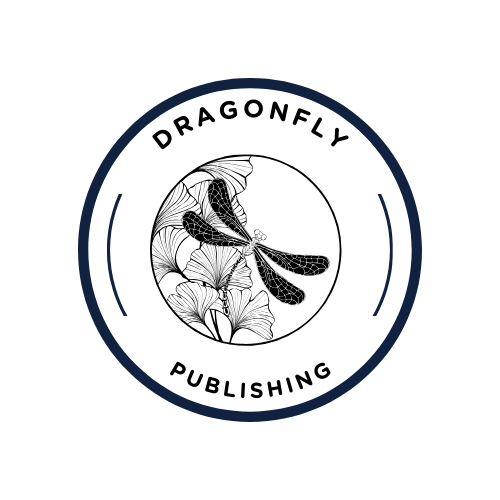
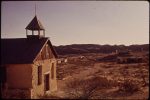
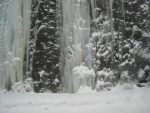
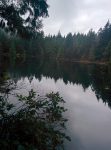
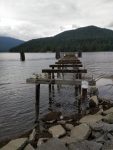
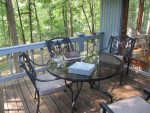

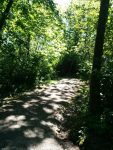
This is beautiful, so full of rich seeing and remembering.
Thank you, Theresa!